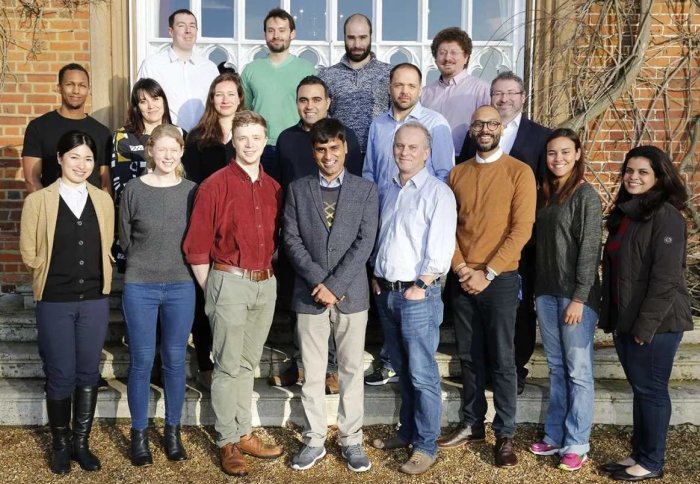New round of programme to help Imperial postdocs turn research into businesses

Postdoctoral researchers at Imperial are invited to apply to a scheme that will help them turn ideas arising from their research into businesses.
The full time, three-month Techcelerate programme offers researchers a chance to get out of the lab and receive specialist training, mentoring and financial support to test the market potential of their ideas.
Techcelerate was great because it took me out of lab. For a few months, I wasn’t working on the technical side, so I was able to work on the commercial side. Dr Marin Sawa
Applications for Techcelerate are open until 25 July 2018 and the programme is scheduled to begin this September. Researchers are invited to apply for the scheme with formal support from their principal investigators, who at little cost to their own time will benefit from the opportunity to demonstrate impact and increase their groups’ entrepreneurial awareness.
Dr Callum Lawrence, Techcelerate Programme Manager, said: “We’re pleased to offer our participants a salary and a great range of resources to explore the market potential of their ideas. With help from our experts, and the chance to meet potential customers and competitors, Techcelerate participants will have an excellent opportunity gain an evidence-based understanding of market needs.”
The nanoscientist who wants to understand epilepsy
 One participant in the programme’s previous cohort was Dr Bakul Gupta, a Research Associate in the Department of Materials. Dr Gupta joined Techcelerate with an idea about how model brains created partly from nanomaterials can be used to detect the onset of epileptic seizures. She used the programme to meet medical specialists in epilepsy, as well as people affected by the condition.
One participant in the programme’s previous cohort was Dr Bakul Gupta, a Research Associate in the Department of Materials. Dr Gupta joined Techcelerate with an idea about how model brains created partly from nanomaterials can be used to detect the onset of epileptic seizures. She used the programme to meet medical specialists in epilepsy, as well as people affected by the condition.
“The best interaction was with families, finding out how they live their lives and what could be done to make it better” Dr Gupta said. “Techcelerate definitely gave me motivation and confidence that there is a need both from a business perspective and from an emotional one.”
Design and biotechnology combine
 Techcelerate also gives participants a chance to meet investors, leading to the possibility of investment Dr Simon Hepworth
Techcelerate also gives participants a chance to meet investors, leading to the possibility of investment Dr Simon Hepworth
Dr Marin Sawa, a Research Associate in Imperial’s Department of Chemical Engineering, was also in the last cohort. Her research had explored how biophotovoltaic technology, which uses bacteria to convert light into electricity, could be harnessed effectively in a solar bio-battery, and this led her to develop a first-of-its-kind ‘biophotovoltaic paper’ on which bacteria are printed like an ink.
Dr Sawa joined Techcelerate to explore the market potential of the technology. She said: “Techcelerate was great because it took me out of lab. For a few months, I wasn’t working on the technical side, so I was able to work on the commercial side”.
Participants are living proof that the right support can help translate research into benefits for society. Dr Simon Hepworth
“Techcelerate is a really great programme because it helps you develop an understanding of how a business is created. Terms like ‘patent’ and ‘spin-off’ can seem very abstract and vague. Now I’ve had first-hand experience, as well as the opportunity to talk to people in different industries and explore who would be interested in our technology.”
Dr Sawa met with a number of potential clients in industry, leading to £30k of in-kind support from the technology company Arm. “We’re partnering with their research department in Cambridge to demonstrate if a solar bio-battery can power an ultra-low energy microprocessor”, she said. This in turn led to £100k funding from the Engineering and Physical Sciences Research Council.
Turning research into benefits for society
Dr Simon Hepworth, Imperial’s Director of Enterprise, said: “We’re delighted to be running the second round of the Techcelerate programme. Participants from the first cohort are living proof that the right support at the right time can make a significant difference in how we translate research into benefits for society. I would encourage any eligible researchers with business ideas to apply. You might be surprised at how much is possible in even quite a short time.”
Techcelerate runs alongside the Imperial-led MedTech SuperConnector, which supports early career researchers from a group of partner institutions in taking medical technologies through to market.
Article text (excluding photos or graphics) © Imperial College London.
Photos and graphics subject to third party copyright used with permission or © Imperial College London.
Reporter
David Silverman
Communications Division